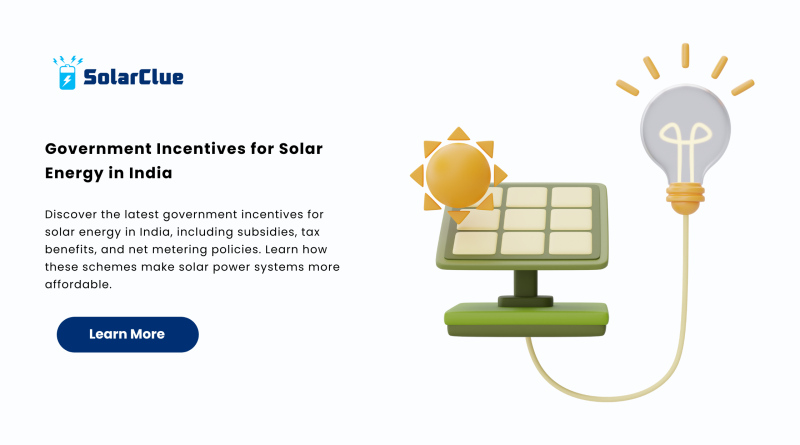Government Incentives for Solar Energy in India
The push for clean and renewable energy in India has never been stronger. The government has introduced a wide range of incentives for solar energy adoption, making it easier for households, businesses, and industries to switch to a sustainable power source. From subsidies on solar power systems to tax benefits and net metering policies, these schemes aim to make solar panels more affordable and accessible. This blog will walk you through the major incentives, eligibility criteria, and how you can benefit from them.
Table of Contents
- 1 Why Government Incentives Matter for Solar Energy
- 2 Major Government Incentives for Solar Energy in India
- 3 How to Avail Government Solar Incentives
- 4 Benefits of Government Incentives
- 5 Challenges and Considerations
- 6 The Future of Solar Incentives in India
- 7 FAQs on Government Incentives for Solar Energy in India
Why Government Incentives Matter for Solar Energy
The cost of installing a solar power system can be significant, especially for large-scale projects. Government incentives bridge this gap by offering financial support, reducing payback periods, and encouraging wider adoption of solar energy. In addition to financial relief, these programs promote environmental sustainability and help India meet its renewable energy targets.
Major Government Incentives for Solar Energy in India
Central Financial Assistance (CFA) for Rooftop Solar
The Ministry of New and Renewable Energy (MNRE) offers subsidies under the Rooftop Solar Programme Phase-II. Residential consumers installing grid-connected solar panels can avail a subsidy of:
-
Up to 40% for systems up to 3 kW
-
20% for systems between 3 kW and 10 kW
These subsidies are directly credited to the consumer’s bank account, making solar energy adoption more budget-friendly.
State-Specific Solar Subsidies
Apart from the central scheme, many states like Gujarat, Maharashtra, and Kerala offer additional incentives for solar panel installations. These may include higher subsidy percentages, interest-free loans, and simplified approval processes.
Net Metering Policies
Net metering allows you to feed excess electricity generated by your solar power system back into the grid and earn credits. This policy reduces your electricity bills and makes solar energy systems more profitable in the long run.
Renewable Energy Certificates (RECs)
RECs are tradable certificates that reward solar energy producers for generating clean power. They can be sold in the market, providing an extra revenue stream for system owners.
Tax Benefits Under Section 80-IA
Commercial and industrial establishments investing in solar power systems can claim tax deductions under Section 80-IA of the Income Tax Act. Accelerated depreciation benefits also help in reducing taxable income.
How to Avail Government Solar Incentives
To benefit from these schemes, follow these steps:
-
Choose a government-approved vendor for your solar panel installation.
-
Apply for subsidies through the MNRE’s online portal or your state’s renewable energy department.
-
Complete installation and submit required documentation, including system details and photographs.
-
Receive your subsidy directly in your bank account after verification.
Benefits of Government Incentives
-
Reduced Installation Costs: Lower upfront investment in solar panels.
-
Faster Payback Period: Quicker return on investment due to subsidies and net metering savings.
-
Environmental Impact: Encourages use of clean solar energy, reducing carbon footprint.
-
Energy Independence: Decreases reliance on conventional power sources.
Challenges and Considerations
While these incentives are highly beneficial, delays in disbursement, limited awareness, and procedural complexities can discourage applicants. Choosing the right vendor and staying updated with policy changes is crucial to maximize benefits.
The Future of Solar Incentives in India

India’s commitment to renewable energy is growing, and future policies are likely to offer even more attractive incentives. With the increasing adoption of solar power systems, the government aims to achieve its target of 500 GW of renewable capacity by 2030.
FAQs on Government Incentives for Solar Energy in India
1. Who is eligible for the solar subsidy in India?
Only residential consumers installing grid-connected solar panels through approved vendors are eligible under the MNRE scheme.
2. Can businesses avail solar subsidies?
Central subsidies are limited to residential users, but businesses can benefit from tax incentives and accelerated depreciation on solar power systems.
3. What is the maximum subsidy for a rooftop solar system?
The MNRE provides up to 40% subsidy for systems up to 3 kW and 20% for 3–10 kW capacity.
4. How does net metering benefit solar users?
Net metering lets you sell excess solar energy to the grid, reducing electricity bills and improving ROI.
5. Are state solar incentives different from central schemes?
Yes, state governments often offer additional subsidies and benefits alongside central programs.
Government incentives have made solar power systems a practical and affordable solution for millions of Indians. By taking advantage of subsidies, tax benefits, and net metering, you can save money while contributing to a cleaner planet. If you are planning to install solar panels, now is the perfect time to act. Explore more about solar solutions at solarclue.com or get in-depth insights on our blog at blog.solarclue.com.




